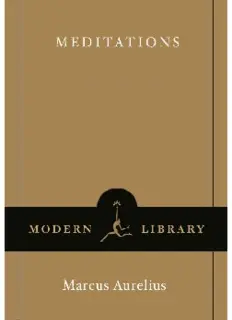Table Of Content
Marcus Aurelius
Meditations
A New Translation, with an Introduction, by Gregory Hays
THE MODERN LIBRARY
NEW YORK
Contents
Title Page
Chronology
Half Title Page
Introduction by Gregory Hays
Meditations
Book 1: Debts and Lessons
Book 2: On the River Gran, Among the Quadi
Book 3: In Carnuntum
Book 4
Book 5
Book 6
Book 7
Book 8
Book 9
Book 10
Book 11
Book 12
Notes
Index of Persons
About the Translator
The Modern Library Editorial Board
Copyright
Meditations
Introduction
Gregory Hays
Marcus Aurelius Antoninus
States will never be happy until rulers become philosophers or philosophers become
rulers.
—PLATO, The Republic
Marcus Aurelius is said to have been fond of quoting Plato’s
dictum, and those who have written about him have rarely
been able to resist applying it to Marcus himself. And
indeed, if we seek Plato’s philosopher-king in the flesh we
could hardly do better than Marcus, the ruler of the Roman
Empire for almost two decades and author of the immortal
Meditations. Yet the title is one that Marcus himself would
surely have rejected. He never thought of himself as a
philosopher. He would have claimed to be, at best, a diligent
student and a very imperfect practitioner of a philosophy
developed by others. As for the imperial throne, that came
almost by accident. When Marcus Annius Verus was born, in
A.D. 121, bystanders might have predicted a distinguished
career in the Senate or the imperial administration. They
could hardly have guessed that he was destined for the
imperial purple, or seen in their mind’s eye the lonely bronze
horseman whose upraised hand greets us from the Capitoline
hill in Rome across two thousand years.
Marcus sprang from a distinguished enough family. The
year of his birth coincided with his grandfather’s second
tenure of the consulship, in theory Rome’s highest office,
though now of largely ceremonial importance. And it was to
be his grandfather who brought him up, for his father died
when he was very young. Marcus makes reference in the
Meditations to his father’s character as he remembered it or
heard of it from others, but his knowledge must have been
more from stories than from actual memories. Of the
remainder of his childhood and his early adolescence we
know little more than can be gleaned from the Meditations.
The biography of him in the so-called Historia Augusta (a
curious and unreliable work of the late fourth century
probably based on a lost series of lives by the third-century
biographer Marius Maximus) tells us that he was a serious
child, but also that he loved boxing, wrestling, running and
falconry, that he was a good ballplayer and that he loved to
hunt. None of these are surprising occupations in an upper-
class youth.
Book 1 of the Meditations offers glimpses of Marcus’s
schooling, and we can fill out the picture by what is known
of upper-class education generally at this period. His first
instructors, like the unnamed teacher mentioned in
Meditations 1.5, were probably slaves, from whom he
would have mastered the rudiments of reading and writing.
At a later stage he would have been handed over to private
tutors to be introduced to literature, especially, no doubt,
Vergil’s great epic, the Aeneid. But literature served only as
a preparation for the real goal. This was rhetoric, the key to
an active political career under the empire, as it had been
under the Republic. Under the supervision of a trained rhetor,
Marcus would have begun with short exercises before
progressing to full-scale practice declamations in which he
would have been asked to defend one side or another in
imaginary law cases, or to advise a prominent historical
figure at a turning point in his career. (Should Caesar cross
the Rubicon? Should Alexander turn back at the Indus? Why
or why not?)
Such training was conducted in Greek as well as Latin.
Since at least the beginning of the first century B.C. the
Roman upper classes had been essentially bilingual, and
Marcus’s spoken and written Greek would have been as
fluent as the French of a nineteenth-century Russian aristocrat
or the Chinese of a Heian Japanese courtier. Marcus would
have read Homer’s Iliad and Odyssey and the tragedies of
Euripides side by side with the Aeneid, and studied the
speeches of the great Athenian orator Demosthenes as
intensively as those of the Roman statesman Cicero. It was
Greek writers and artists who constituted the intellectual
elite at the capital; when in later life the emperor conversed
with his court physician, Galen, he would have done so in the
latter’s native tongue. Above all, Greek remained
overwhelmingly the language of philosophy. In the late
Republic and early empire, writers like Lucretius, Cicero
and Seneca had worked to create a philosophical literature in
Latin, with notable success. But the great thinkers—Plato,
Aristotle, Theophrastus, Zeno, Chrysippus, Epicurus, etc.—
had all been Greeks. Serious philosophical investigation
required a familiarity with the language they wrote in and the
terminology they developed. That Marcus composed his own
Meditations in Greek is natural enough.
In 137, when Marcus was sixteen, a crucial event took
place. The reigning emperor, Hadrian, was childless. An
illness had brought him near to death a year previously, and
it was clear that he would not live forever. Hadrian owed his
throne to his adoption by his predecessor and distant
relative, Trajan. Following Trajan’s example, Hadrian had
designated the distinguished aristocrat Lucius Ceionius
Commodus to succeed him. In 137, however, Ceionius died
unexpectedly, and Hadrian was forced to cast about for a
new successor. His choice fell on the childless senator
Antoninus, whom he selected with the proviso that Antoninus
should in turn adopt Marcus (his nephew by marriage) along
with Ceionius’s son Lucius Verus, then aged seven. Marcus
took on the family name of his adopted father, becoming
Marcus Aurelius Antoninus.

